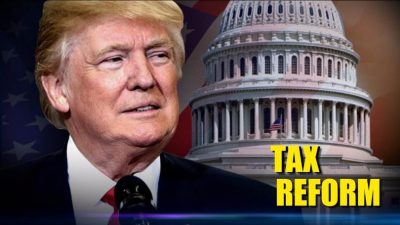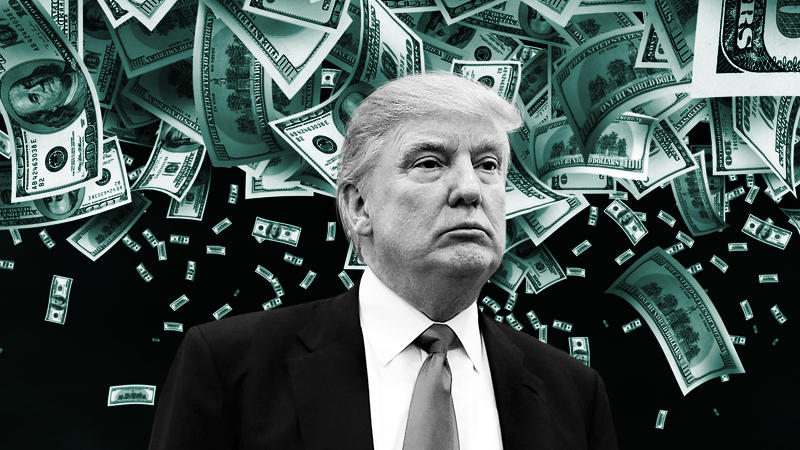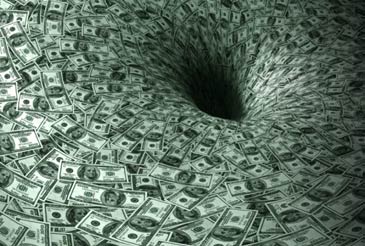The Economic Implications of Trump’s Trade and Tax Policies

“We should be trying to foster the growth of two-way trade, not trying to put up roadblocks, to open foreign markets, not close our own.”
President Ronald Reagan (1911-2004), in a radio address to the Nation on free and fair trade and the budget deficit, May 16, 1987.
“Genuine free traders look at free markets and trade, domestic or international, from the point of view of the consumer (that is, all of us), the mercantilist, of the 16th century or [of] today, looks at trade from the point of view of the power elite, big business in league with the government.”
Murray Rothbard (1926-1995), American economist, (in a 1983 article, ‘The NAFTA Myth’, Mises Daily, Nov. 30, 2013)
“…I do think we’re much safer and I hope that [another financial crisis] will not be in our lifetimes and I don’t believe it will be.”
Janet Yellen (1946- ), U.S. Federal Reserve Chair, (statement made on Tuesday, June 27, 2017, in London U.K.)
***
Sudden changes in trade and tax policies, the likes of those considered by the Trump administration, could be very disruptive to macroeconomic equilibrium, especially if they result in a sudden burst of inflation and in rapid interest rate hikes. Indeed, raising taxes on imports, repatriating large corporate profits parked overseas and increasing the fiscal deficit, when the economy is running at close to full capacity, can result in both demand-led and supply-led inflation. This could come much faster than most people expect, if all these measures are implemented in the coming years.
After 35 years of declining inflation and declining nominal and real interest rates since 1982, the tide is about to turn, partly as a consequence of the populist and protectionist policies of the Trump administration. With widely unexpected higher inflation rates and higher interest rates just around the corner, protectionist trade policies and higher fiscal deficits just as the Fed embarks upon a series of interest rates increases could have recessionary consequences. Moreover, since the end of the 2008-09 recession in June 2009, the influence of the 9.2 years economic cycle cannot be underestimated.
Let us see why.
- Trump’s trade policies will be inflationary
 For President Donald Trump and his advisors, international trade is some sort of a zero-sum game. It is, in their eyes, a win/lose proposition. When countries enter into multilateral international trade and investment agreements, some countries are said to “win” and some other countries are said to “lose”. Over time, such a trade theory has been completely discredited. Indeed, nothing can be further from the truth, because in most cases, international trade is a win/win proposition, in which workers, investors and consumers win on both sides.
For President Donald Trump and his advisors, international trade is some sort of a zero-sum game. It is, in their eyes, a win/lose proposition. When countries enter into multilateral international trade and investment agreements, some countries are said to “win” and some other countries are said to “lose”. Over time, such a trade theory has been completely discredited. Indeed, nothing can be further from the truth, because in most cases, international trade is a win/win proposition, in which workers, investors and consumers win on both sides.
International trade is what makes economies prosper, and all countries benefit from international trade, to various degrees. Most economists agree that, in the current state of economic development of most industrial countries, trade protectionism is a dead end, which can be dangerous for the U.S. economy and its trading partners, such as Canada.
However, what Donald Trump seems to believe in—judging by his pronouncements at least—is ‘managed international trade’ and government planning, preferably in a bilateral way, not in one particular economic sector for social and economic reasons, but for all sectors of the economy. Such a system was tried in the old Soviet Union, and that economic system collapsed in 1991.
In fact, Donald Trump professes to want to repudiate sixty years of increased multilateral economic cooperation between countries, based on economic laws and macroeconomic accounting. His goal is to adopt a mercantilist and protectionist approach to international economic relations, i.e. develop a positive trade balance with other countries. Such an approach would be a throwback to a theory that was prevalent in the 17th and 18th centuries in Europe. In other words, this has been tried many times before.
If the Trump administration were to get his protectionist way and were allowed by the U.S. Congress to play the apprentice sorcerer with international trade and international investment, the latter will contract, labor productivity will fall and costs of production will rise, jobs will be lost, real incomes will decline even though some money wages would increase, inflation will rise and the same for nominal interest rates. It would only be a matter of time before there would be a return to a 1970-style stagflation.
- Trade facts regarding the United States.
In 2016, total U.S. trade deficit in goods and services was $502 billion. Indeed, during that year, the U.S. imported for $2.711 trillion of goods and services while exporting $2.209 trillion.
In the same year, the U.S. registered a deficit in goods only totaling $750 billion, while realizing a trade surplus of $248 billion in service trade (financial, insurance and banking services, royalties and license fees, transport and business services, etc.). This is an indication that the U.S. service industry is very competitive in the global market and this has created a lot of jobs in the United States. This services trade surplus helps offset the deficit in goods.
- Adjustments in the overall U.S. balance of payments
Of course, this is not the end of the story. The reason the U.S. economy can buy more goods than it makes, in a given year, is due to the fact that it borrows capital (savings) from other countries, on a net basis. Such net borrowings from foreign lenders helped cover its current account deficit and kept American consumption spending high. This also helped to finance part of the huge fiscal deficits registered year after year by the U.S. government. In 2016, for example, the U.S. government domestic fiscal deficit was $552 billion.
Thus, the main reason why the United States, as a country, has a trade deficit is because it overspends and does not save enough, especially its government with its multiple costly wars abroad (US$5.6 trillion spent on wars, directly and indirectly, since 2001).
The United States as a whole is spending more money than it makes. This results in a chronic domestic fiscal deficit, and this means also that the United States, as a country, must borrow from foreign lenders to finance its external deficit. In other words, the United States lives beyond its means. However, American politicians want to lower taxes by a whooping $1.5 trillion US, over the next ten years, and increase the central government’s fiscal deficit. They do not seem to see the link between their public dissaving and their external indebtedness and external trade deficit.
President Donald Trump professes to want to correct U.S. trade deficits in goods and services by unilaterally reducing American imports and by increasing exports. But international trade is a two-way street: countries pay for their imports with their exports. Such a beggar-thy-neighbor approach could easily lead to trade wars, and the result could be catastrophic. If this were to happen, indeed, the entire international trade system would contract and this would bring about a worldwide economic downturn from which no country would escape.
The Trump administration should avoid making rash decisions regarding the North American Trade Agreement (NAFTA), which took years to be negotiated and implemented. The very idea of killing a successful and functioning trade agreement in the hope of starting from scratch is a most hazardous proposition. It could have dire economic and political consequences. Such a rash decision would carry a lot of risks and would not be a wise move.
Basically, if a particular country really wants to reduce its trade deficit with other countries, it would need to borrow less and save more. Tinkering with border excise taxes and other protectionist policies would not change the basic underlying cause of the foreign deficit.
- The U.S. dollar role as an international currency could be in jeopardy
Part of the U.S.’s annual trade deficit with the rest of the world results from the fact that a big chunk of multilateral international trade is financed in U.S. dollars and that the U.S. dollar is used as a reserve currency by many countries. Other countries pay the United States for using banking services in U.S. dollars. Such external revenues are called seigniorage. This allows the United States to import more goods than it exports and to borrow funds from abroad at a subsidized rate.
 Indeed, the United States, because of the size of its money and capital markets, is the owner of a global reserve currency, the American dollar. This ensures a strong demand for U.S. dollars and for U.S. debt instruments. Imagine what the cost of imported goods in the U.S. would be if there was a drop in the demand for the U.S. dollar?
Indeed, the United States, because of the size of its money and capital markets, is the owner of a global reserve currency, the American dollar. This ensures a strong demand for U.S. dollars and for U.S. debt instruments. Imagine what the cost of imported goods in the U.S. would be if there was a drop in the demand for the U.S. dollar?
Some countries have attempted recently to use other currencies to finance their international trade. For instance, China has pressed Saudi Arabia to accept its currency, the yuan, as a mode of payment for its oil imports. In addition, the International Monetary Fund presently recognizes the Chinese currency as an international reserve currency. If the U.S. were to withdraw from its policy of international economic cooperation, its economic and financial influence would decline and some other country could likely pick up the relay.
- Tax policies can be inflationary if they over-stimulate an economy already running at full capacity
The Trump administration and its allies in Congress would like to substantially reduce personal and corporate taxes and seem willing to accept a substantial rise in the yearly fiscal deficit and in the U.S. public debt. Ironically, if this fiscal policy were to lead to more U.S. foreign borrowings, it would partly contradict the objectives pursued with the trade policy. Indeed, such increased borrowing abroad would strengthen the foreign exchange value of the U.S. dollar, and would encourage imports while hurting exports. A larger fiscal deficit would also put pressures on interest rates. Financial markets (bonds and stocks) would suffer and this would have a recessionary effect on the economy.
All this would happen, when income and wealth inequalities in the U.S. are the highest in a century and when the huge speculative bubble in the financial markets could burst at any moment.
Conclusion
I would recommend that the Trump administration coordinate its trade and tax policies. It should be careful not to upset the economic apple cart when it deals with the existing system of international trade and investment, and it should be careful not to overheat an economy running at close to full capacity. Otherwise, it may be sowing the seeds of the next economic recession.
This article was first published on The New American Empire
Economics Professor Rodrigue Tremblay is the author of the book “The Code for Global Ethics, Ten Humanist Principles”, and of “The New American Empire”.
Featured image is from Watching America.

